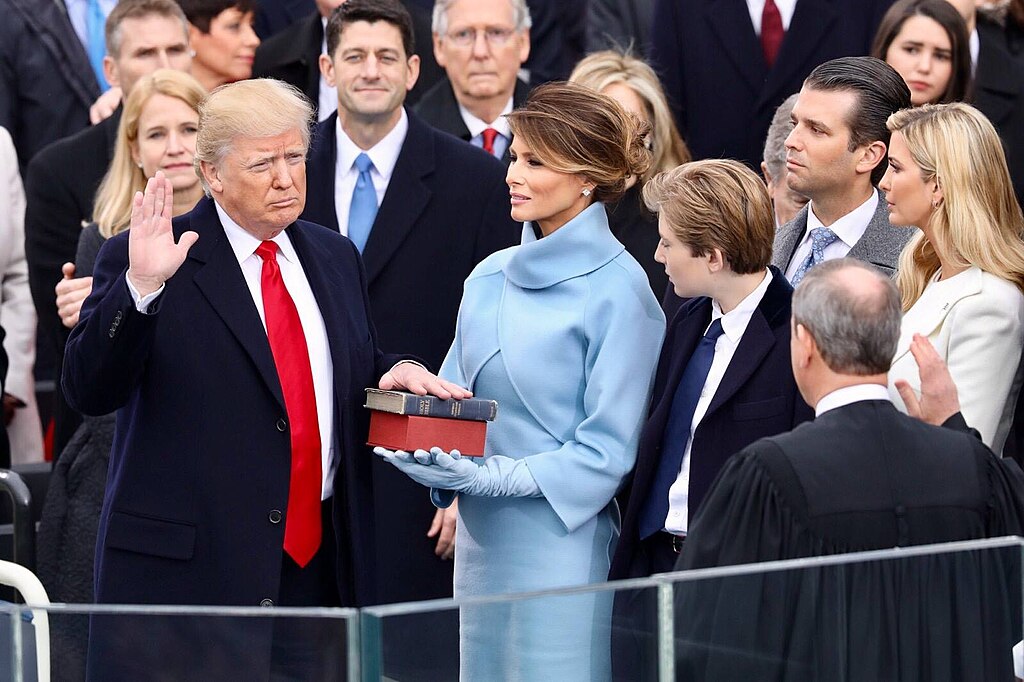President-elect Donald Trump’s recent announcement of a 25% tariff on goods from Mexico has ignited fierce debate across political and economic circles. The controversial move, aimed at curbing illegal drug trafficking and migration, has drawn sharp criticism and prompted a direct response from Mexican President Claudia Sheinbaum Pardo. However, claims circulating on social media that Sheinbaum pledged to halt migrant caravans have been debunked, raising questions about the narrative surrounding the tariff threats.
Mexico Pushes Back Against Tariff Claims
In a detailed letter addressed to Trump, Sheinbaum outlined Mexico’s ongoing efforts to manage migration and combat drug trafficking, emphasizing that her administration has already reduced border crossings significantly. She cited U.S. Customs and Border Protection (CBP) data indicating a 75% decrease in encounters at the U.S.-Mexico border from December 2023 to November 2024. Additionally, she highlighted the success of the CBP One program, through which half of the migrants crossing the border now arrive via legally scheduled appointments.
Contrary to claims made by conservative commentators, Sheinbaum’s letter does not include any new commitments to block caravans. Instead, it underscores the existing policies and challenges Trump’s rhetoric about Mexico’s role in migration and drug-related issues.
“Migrant caravans no longer arrive at the border,” Sheinbaum stated, attributing the decline to comprehensive policies already in place. The letter also called for a collaborative approach to address the root causes of migration and drug trafficking, warning that tariffs would strain economic ties between the two nations.
Debunking the Claims
Conservative voices, including Turning Point USA’s Charlie Kirk and news director Eric Daugherty, took to social media to claim that Sheinbaum had capitulated to Trump’s tariff threats. However, their assertions misrepresented the content of Sheinbaum’s letter. Fact-checkers, including Newsweek, confirmed that Sheinbaum’s statements were a continuation of Mexico’s established policies rather than a reaction to Trump’s announcement.
Sheinbaum also used the letter to highlight other pressing concerns, including the trafficking of firearms from the U.S. into Mexico and the need for international cooperation to combat the fentanyl crisis. She argued that tariffs would jeopardize economic stability and urged dialogue over threats as the path forward.
Netizens React to the Controversy
Social media erupted with reactions to the claims, with users weighing in on both sides of the debate:
-
@BorderWatcher2024: “Sheinbaum isn’t playing games. Trump’s tariffs are just political theater. Mexico’s policies were already working.”
-
@TruePatriotTX: “This is the Trump effect! Mexico knows they can’t mess with us anymore. America first!”
-
@FactCheckFan: “Why spread lies when the facts are clear? Sheinbaum’s letter didn’t promise anything new. Stop the spin.”
-
@TradeExpert101: “Tariffs are a lose-lose. Mexico is right—this will hurt jobs and trade for both countries.”
-
@MigrationMatters: “Finally, someone is addressing the root causes of migration instead of resorting to empty threats.”
-
@NewsJunkie: “Both sides need to sit down and hash this out. Tariffs won’t solve the real issues.”
Economic and Political Implications
As the U.S. prepares for Trump’s presidency, the debate over tariffs and migration policies underscores the complex relationship between the two nations. Sheinbaum’s letter, while forceful, reflects the challenges of balancing domestic pressures with international diplomacy.



 Zelenskiy Urges Change in Iran After U.S. and Israeli Strikes, Cites Drone Support for Russia
Zelenskiy Urges Change in Iran After U.S. and Israeli Strikes, Cites Drone Support for Russia  Argentina Tax Reform 2026: President Javier Milei Pushes Lower Taxes and Structural Changes
Argentina Tax Reform 2026: President Javier Milei Pushes Lower Taxes and Structural Changes  Macron Urges Emergency UN Security Council Meeting as US-Israel Strikes on Iran Escalate Middle East Tensions
Macron Urges Emergency UN Security Council Meeting as US-Israel Strikes on Iran Escalate Middle East Tensions  AI is already creeping into election campaigns. NZ’s rules aren’t ready
AI is already creeping into election campaigns. NZ’s rules aren’t ready  Iran Supreme Leader Ayatollah Ali Khamenei Killed in Israeli, U.S. Strikes: Reuters
Iran Supreme Leader Ayatollah Ali Khamenei Killed in Israeli, U.S. Strikes: Reuters  Middle East Conflict Escalates After Khamenei’s Death as U.S., Israel and Iran Exchange Strikes
Middle East Conflict Escalates After Khamenei’s Death as U.S., Israel and Iran Exchange Strikes  Netanyahu Suggests Iran’s Supreme Leader Khamenei May Have Been Killed in Israeli-U.S. Strikes
Netanyahu Suggests Iran’s Supreme Leader Khamenei May Have Been Killed in Israeli-U.S. Strikes  Trump Announces U.S. Strikes on Iran Navy as Conflict Escalates
Trump Announces U.S. Strikes on Iran Navy as Conflict Escalates  Trump to Address Nation as U.S. Launches Strikes in Iran, Axios Reports
Trump to Address Nation as U.S. Launches Strikes in Iran, Axios Reports  Trump Says U.S. Attacks on Iran Will Continue, Warns of More American Casualties
Trump Says U.S. Attacks on Iran Will Continue, Warns of More American Casualties  UK Accepts U.S. Request to Use British Bases for Defensive Strikes on Iranian Missiles
UK Accepts U.S. Request to Use British Bases for Defensive Strikes on Iranian Missiles  Suspected Drone Strike Hits RAF Akrotiri Base in Cyprus, Causing Limited Damage
Suspected Drone Strike Hits RAF Akrotiri Base in Cyprus, Causing Limited Damage  Australia Rules Out Military Involvement in Iran Conflict as Middle East Tensions Escalate
Australia Rules Out Military Involvement in Iran Conflict as Middle East Tensions Escalate  Why did Iran bomb Dubai? A Middle East expert explains the regional alliances at play
Why did Iran bomb Dubai? A Middle East expert explains the regional alliances at play  Trump Launches Operation Epic Fury: U.S. Strikes on Iran Mark High-Risk Shift in Middle East
Trump Launches Operation Epic Fury: U.S. Strikes on Iran Mark High-Risk Shift in Middle East  Trump Says U.S. Combat Operations in Iran Will Continue Until Objectives Are Met
Trump Says U.S. Combat Operations in Iran Will Continue Until Objectives Are Met  U.S. Lawmakers Question Trump’s Iran Strategy After Joint U.S.-Israeli Strikes
U.S. Lawmakers Question Trump’s Iran Strategy After Joint U.S.-Israeli Strikes 
































